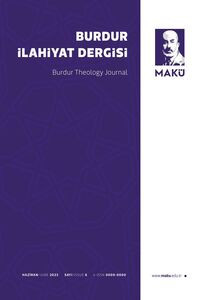Sa’y, Atalet, İktisat Ahlâkı ve Zihniyeti Kavramları Etrafında Mehmed Akif ve Sabri Ülgener
Bu yazı, on dokuzuncu yüzyılın ilk çeyreğinde Osmanlı insanının atalet içinde bulunduğunu nazım ve nesrinde dile getiren Mehmed Akif ile Osmanlı devletinin iktisadi geriliği için benzer teşhisleri olan Sabri Ülgener’in düşüncelerini değerlendirme gayesiyle kaleme alınmıştır. Osmanlı Devleti, yirminci yüzyılın ilk çeyreğinde coğrafi bakımdan daraldı ve idari ve siyasi anlamda tarih sahnesinden çekildi ve yerini Türkiye Cumhuriyeti Devleti aldı. Ne var ki çalışma üretme ve atalet meselesinde toplum fertlerinin asırların ürünü olan zihniyeti aynı kaldı. Cumhuriyet döneminde de ülke insanının çalışma ve üretme azminin düşüklüğü, Batıya kıyasla bariz geri kalmışlık büyük sorunlardan biri olmaya devam etti. Mehmed Akif, birçok meselenin yanında nazmında Osmanlı insanının çalışma, zaman ve dünya hayatı idrakine düşünce ve eserlerinde çağdaşı şair ve düşünürlerden daha fazla yer verdi. Hissiyatı ve ıstırabını başta Safahat olmak üzere vaazları ve mecmulardaki yazılarında dile getirdi. Tenkitle yetinmeyip hal ve ıslahı için tekliflerini açıkladı.
Mehmed Akif and Sabri F. Ülgener Around the Concepts of Working Hard, Idleness, Economic Ethics and Mentality
This article was written with the aim of evaluating the thoughts of Mehmed Akif, who expressed in his verse and prose that the Ottoman people were idle and lazy in the first quarter of the nineteenth century, and Sabri Ülgener, who had similar diagnoses for the economic backwardness of the Ottoman state. The Ottoman Empire shrank geographically in the first quarter of the twentieth century, and withdrew from the historical scene in administrative and political terms, and was replaced by the Republic of Turkey. However, the mentality of the members of the society, which is the product of centuries, remained the same in the issue of work production and inertia. The low determination of the people of the country to work and produce, and the obvious backwardness compared to the West continued to be one of the major problems in the Republican period. Besides many issues, Mehmed Akif gave more place to the Ottoman people's understanding of work, time and worldly life in his poetry than his contemporary poets and thinkers. He expressed his feelings and suffering in his sermons and articles in magazines, especially Safahat. Not content with criticism, he explained his offers for his condition and improvement. As an economist, lawyer and sociologist, Sabri F. Ülgener wondered about the historical and sociological reasons for the issue of speed and inertia, which has a great place in Akif's verse. Inspired by Max Weber's thesis, he researched the mentality of the Ottoman people by using the data he produced from his extensive bibliography consisting of basic works from tevarihname and divans to Nefahâtü'l-Üns, Müzekki'n-Nüfûs and Marifetnâme to Ahlâk-ı Alâî. He built a scientific theory about the roots of inertia and stagnation. In this study, it will be examined how Mehmet Akif comprehended the phenomenon of work and what kind of method he devised while constructing his mind, and the mentality theory of Ülgener, who analyzed the economic ethics and mentality of the Ottoman period over the fifteenth and sixteenth centuries, will be summarized. Finally, how the two thinkers approached the issue in terms of cause and effect will be compared and discussed.
Keywords:
Ottomans, Economics, Moral Values, Ethics, İdleness, Working Hard, İntrinsic Sufism,
___
- Cengiz, Osman, “Ülgener’in Ortaçağ İktisat Ahlakı ve Zihniyet Tahlilinin Teorik Tasnifi”, Tarih Okulu Dergisi 36 (Ekim, 2018), 421-442.
- Demirli, Ekrem. “Mehmed Akif’in Şiirinde Tasavvuf: Safahat’ı Bir Tasavvuf-Ahlak Metni Olarak Okumak”, Vefatının 75.Yılında Uluslararası Mehmed Akif Ersoy Sempozyumu Bildiriler Kitabı, İstanbul: Zeytinburnu Belediyesi Kültür Yayınları, 2011.
- Ersoy, Mehmed Akif. Safahat, İstanbul: MAKÜ Yayınları, 2021.
- Kara, İsmail. “Akif’in Aktif Din ve Ahlâk Anlayışı”, Vefatının 75.Yılında Uluslararası Mehmed Akif Ersoy Sempozyumu Bildiriler Kitabı, İstanbul: Zeytinburnu Belediyesi Kültür Yayınları, 2011.
- Köse, Ali, “Modernleşme-Sekülerleşme İlişkisi Üzerine Yeni Paradigmalar”, Liberal Düşünce Dergisi 24 (Güz 2001), 150-165.
- Kuntay, M. Cemal. Mehmed Akif, İstanbul: Oğlak Yayınları, 2015.
- Öz, Mehmed. “Reaya”, Türkiye Diyanet Vakfı İslam Ansiklopedisi, Ankara: TDV Yayınları, 2006. 7/490-493.
- Sayar, Ahmet Güner. Çekiçle Örs Arasında: Mehmed Akif Ersoy, İstanbul: Ötüken Yayınları, 2021.
- Sayar, Bir İktisatçının Entelektüel Portresi Sabri F. Ülgener, İstanbul: Eren Yayınları, 1998.
- Şahin, Mehmet-Göküş, Şeref. “Şeyh Ahî Dâ’î Fütüvvetnâmesi’ndeki Ahlâkî Değerler”, Turkish Studies-Comparative Religious Studies, 2020, 15(2), 237-254.
- Şentürk, Mustafa. “Kur’ân’da Toplumsal Değişme Olgusu-Disiplinlerarası Bir Giriş Denemesi”, Marife 14/2 (2014/2), 25-42.
- Ülgener, Sabri F., İktisadi Çözülmenin Ahlak ve Zihniyet Dünyası, İstanbul: Der Yayınları, 1981a.
- Ülgener, Sabri F., Zihniyet ve Din İslam Tasavvuf ve Çözülme Devri İktisat Ahlakı, İstanbul: Der Yayınları, 1981b.
- Ülgener, Sabri F., Zihniyet, Aydın ve İzmler, İstanbul: Derin Yayınları, 2006.
- Başlangıç: 2023
- Yayıncı: Burdur Mehmet Akif Ersoy Üniversitesi
Sayıdaki Diğer Makaleler
Yıldıray SİPAHİ, Gülberk GÜRBÜZER
Nisâ Sûresi Bağlamında Yetimlerle İlgili Âyetlerin Edebî Üslup Özellikleri
Bedriye DURAN BAKIRCI, Ramazan KAZAN
Arapça’nın Hevsâ Dilinin Gelişmesine Etkisi
Ebü’l-Kâsım el-Müeddib’e Göre Arapça Emir Kipleri ve Kur’ân’daki Yansımaları
Mustafa Sabri Efendi’nin İ‘tibâru Meâlâti’l-Ef‘âl Anlayışı
İbnü's-Salâh'ın Mukaddime'sinin Hadis Usulü Tarihindeki Yerine Dair Bir İnceleme
Şart Muhayyerliğinin Hukuki Niteliği Üzerine Mukayeseli Bir İnceleme
